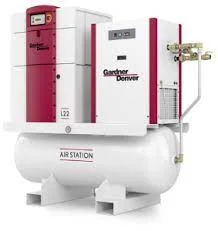
Compressed air has become a vital utility in the day-to-day operations of most companies. Businesses are well aware of the need for compressors, but there is considerable debate as to which of the two most popular types – rotary screw or reciprocating – works best in an application. As a supplier of Gardner Denver compressors, today we’re discussing similarities and differences between them to help you select the best one for your application.
Rotary screw compressors are used extensively in applications above 30 hp and for air up to 150 psig. Reciprocating compressors cover low horsepower and demanding applications where reliability is essential.
Gardner Denver compressors are used with a wide range of gases, but air compression is the largest application. Stationary rotary screw compressors account for about 40% of the air market, while reciprocating Gardner Denver compressors possess 21% of market share by dollars.
Above 30 hp: Rotary screw compressors have taken over nearly all of the standard plant air 100-150 psig market above 30 hp. Improvements in the performance and reliability of these compressors, coupled with reduced maintenance and lower initial cost, are key factors driving this trend.
Although a double-acting reciprocating is still the most efficient compressor, rotary screw models have narrowed the efficiency gap. Better rotor profiles, machining improvements, and design innovations are contributing factors.
Maintenance: When it comes to maintenance costs, Gardner Denver rotary screw compressors have an advantage over reciprocating. Double-acting reciprocating compressors typically require more periodic maintenance than rotary screws. Valves, piston rings, and other consumables on a reciprocating compressor need expensive routine maintenance.
Rotary screw compressor maintenance is limited mostly to oil, oil filter, and air/oil separator changes. At some point there is a sizable cost associated with a rotary screw air end replacement, but they often last 10 years or more.
Lubrication: Reciprocating Gardner Denver compressors are divided into two categories – lubricated and non-lubricated. In lubricated units, oil is introduced into the compression cylinder to minimize wear of the cylinder and piston rings. In an average application, lubricated rings should last for several years. Advances in new compression ring materials are extending ring life in non-lubricated units to more than 8000 hr.
Below 30 hp: Small air-cooled reciprocating compressors have been used extensively in applications requiring pressures up to 175 psig. Large and small air-cooled units are well suited for use in harsh environments.
The most common small reciprocating compressor is the single-acting design. Operating temperatures can reach 380 F and most units operate at sound levels above 80 dBA.
For lower horsepower applications, reciprocating Gardner Denver compressors are considered a good value because the initial purchase price is generally 40-60% less than a rotary screw compressor.
Installation: Small reciprocating machines should be used with an air receiver. The receiver stores compressed air and minimizes the loaded run time of the compressor. Some small reciprocating compressors have a limited duty cycle of around 66%.
It is particularly important to the life of these compressors to use an adequately sized receiver. No matter what the receiver size or configuration of the compressor and receiver, small reciprocating machines are relatively easy to install. Any reciprocating compressor should always be anchored to the floor due to unbalanced forces.
The majority of small rotary packages are designed to stand-alone. Base-mounted units can be mounted on top of an air receiver. Air is discharged from rotary screw compressors without pulsations. However, it is a good idea to include a receiver in the system to smooth the control air signal back to the compressor controller and provide consistent operation.
Overall, compressed air quality from rotary screw compressors is good. Even though the rotary can be an oil-flooded machine, an efficient air/oil separator reduces oil carryover into the compressed air system to less than 5 ppm.
Need help choosing the right Gardner Denver compressor for your application? Call us today and one of our experts will answer all your questions and assist you in making the right decision.



Notifications